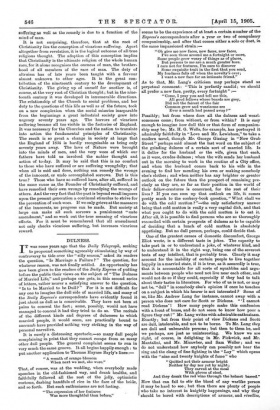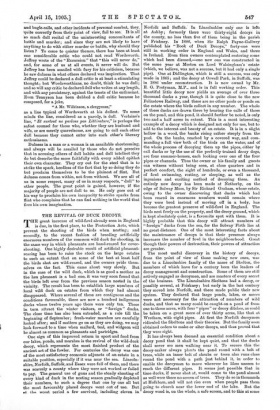I T was some years ago that the Daily Telegraph, seeking
to propound something agreeably stimulating by way of controversy to tide over the " silly season," asked its readers the question, " Is Marriage a Failure ? " The question, for whatever reason, was not finally settled. An opportunity has now been given to the readers of the Daily Express of putting before the public their views on the subject of " The Dulness of Married Life," and perhaps one gets, in this second series of letters, rather nearer a satisfying answer to the question, " Is to be Married to be Dull? " For it is not difficult for any one to imagine the dull side of married life, and many of the Daily Express's correspondents have evidently found it just about as dull as is conceivable. They have not been at pains to conceal the fact ; some, possibly, would not have managed to conceal it had they tried to do so. The recitals of the different kinds and degrees of dulnesses to which married people, it would seem, are practically bound to succumb have provided nothing very striking in the way of personal narrative.
It is surely a distressing spectacle,—so many dull people complaining in print that they cannot escape from so many other dull people. The general complaint seems to run in very much the same groove. It all begins happily enough : to put another application to Thomas Haynes Bayly's lines:—
" A wreath of orange blossom When next we met, she wore."
That, of course, was at the wedding, when everybody made speeches in the old-fashioned way, and drank heaths, and faithfully followed all the rest of the jolly, optimistic customs, dashing handfuls of rice in the face of the bride, and so forth. But such enthusiasms are not lasting.
" The expression of her features Was more thoughtful than before,"
seems to be the experience of at least a certain number of the Express's correspondents after a year or two of compulsory companionship, and after that comes either a solo or duet, in the same impassioned strain :- " Oh give me new faces, new faces, new faces,
I've seen those around me a fortnight or more, Some people grow weary of things as of places, But persons to me are a much greater bore.
I care not for features, I'm sure to discover Some exquisite trait in the first that you send, My fondness falls off when the novelty's over; I want a new face for an intimate friend."
As to that, Mr. Lang's criticism may perhaps stand as perpetual comment : "This is perfectly candid ; we should all prefer a new face, pretty, every fortnight" :— " Come, I pray you and tell me this,
All good fellows whose beards are grey, Did not the fairest of the fair Common grow and wearisome ere Ever a month had passed away ?"
Possibly; but from where does all the dulness and weari- someness come ; from without, or from within? It is easy enough to imagine how dull this or that form of companion- ship may be; Mr. H. G. Wells, for example, has portrayed it admirably faithfully in "Love and Mr. Lewisham," to take a
modern novel, though Mr. George Gissing in "New Grub Street " perhaps said almost the last word on the subject of the grinding dulness of a certain sort of married life. Is it duller for the husband or the wife, given that each, as it were, exudes dulness ; when the wife sends her husband out in the morning to work in the routine of a City office, and when the husband comes back to his wife in the evening to find her mending his own or making somebody else's clothes ; and when neither has any brighter or greater outlook on the future than the prospect of remaining pre- cisely as they are, so far as their position in the world of their fellow-creatures is concerned, for the rest of their lives ? If you can sum up that outlook on life, it comes pretty much to the cookery-book question, " What shall we do with the cold mutton ? "—the only satisfactory answer being that cold mutton is really a very capital dish, and that what you ought to do with the cold mutton is to eat it. After all, it is possible to find persons who are so thoroughly reconciled with certain prospects of dulness as to be capable of deciding that a lunch of cold mutton is absolutely appetising. But no dull person, perhaps, could decide that.
One of the greatest causes of domestic discomfort, George Eliot wrote, is a different taste in jokes. The capacity to take part in or to understand a joke, of whatever kind, and to understand it in the right way, being one of the severest tests of any intellect, that is probably true. Clearly it may account for the inability of certain people to live together happily in a married state, if it is true, as it assuredly is true, that it is accountable for all sorts of squabbles and argu- ments between people who need not live near each other, and would not do so if they could, especially if they had to talk about their tastes in literature. For who of us is not, or may not be, " dull " in somebody else's opinion if once he touches on a subject in which his hearer is not interested ? Some of us, like Mr. Andrew Lang for instance, cannot away with a person who does not care for Scott or Dickens. "'I cannot read Dickens' 1 How many people make this confession with a front of brass, and do not seem to know how poor a figure they cut !" Mr. Lang writes with admirable enthusiasm. Exactly ; but from their point of view Dickens and Scott are dull, intolerable, and not to be borne. To Mr. Lang they are dull and unbearable persons ; but then to them he, and we perhaps, are just as uninteresting. We know we are right, of course, in delighting in Mr. Pickwick, and Mr. Mantalini, and Mr. Micawber, and Sam Weller ; and we do not understand how anybody can possibly not hear the ring and the clang of fine fighting in the " Lay" which opens with the "nine and twenty knights of fame" who
" Quitted not their armour bright
Neither by day nor yet by night ; They carved at the meal With gloves of steel,
And they drank the red wino through the helmet barred."
How that can fail to stir the blood of any warlike person it may be hard to see ; but then there are plenty of people who take no interest in knightly happenings, and why they should be bored with descriptions of armour, and reveilles, and bugle-calls, and other incidents of personal combat, they, 'quite correctly from their point of view, fail to see: It is all "so much dull recital of the uninteresting concomitants of battle and murder; and since they are not likely to have anything to do with either murder or battle, why should they listen P To come to quieter themes, there has been at least one considerable critic who could not read Wordsworth. Jeffrey wrote of the "Excursion" that "this will never do," and, for some of us at all events, it never will do. But Jeffrey has been assailed with fury for his criticism, because he saw dulness in what others declared was inspiration. That Jeffrey could be declared a dull critic is at least a stimulating thought; but Wordsworthians, no doubt, think he was dull; and so will any critic be declared dull who writes at any length, and with any persistency, against the tenets of the enthusiast. Even Tennyson has been dubbed a dull critic because he composed, for a joke, "A Mr. Wilkinson, a clergyman,"
as a line typical of Wordsworth at his dullest. To some minds the line, considered as a parody, is dull. Verlaine's line, "Et surtout ne parlous pas Litterature," is perhaps the safest counsel for those who, whether they are husband and -wife, or are merely quarrelsome, are going to call each other dull because they cannot enter into each other's literary enthusiasms.
Dulness in a man or a woman is an assailable shortcoming, and always will be assailed by those who do not perceive that in accusing others of dull habits and dull intellect they do but describe the more faithfully with every added epithet their own character. They cry out for the steel that is to strike the spark, heedless of the fact that by so doing they do but proclaim themselves to be the plainest of flint. But dulness comes from within, not from without. We are all of us in some respect, many of us in many respects, " dull" to other people. The great point is gained, however, if the majority of people are not dull to us. He only goes out of his way to proclaim his own incapacity to strike sparks from flint who complains that he can find nothing in the world that fires his own imagination.











































 Previous page
Previous page